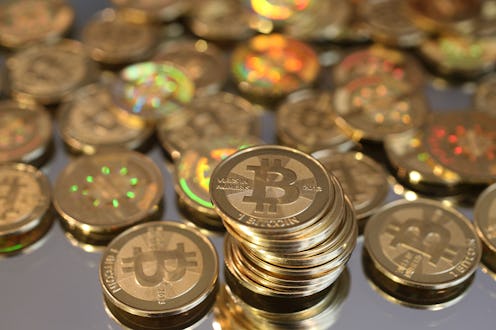News
The Senate Is Trying To Regulate Bitcoins Now
If you're still one of the many, many people asking "Guys, what the eff is Bitcoin?" you're not the only one. After Bitcoin's steady rise from the ashes of its black-market past — Bitcoin's trading value is at an all-time high, and Chinese investors are latching onto the digital currency — the U.S. Senate has called for a hearing to figure out what a Bitcoin is, what it does, and whether it's safe. On Monday afternoon, the Senate will examine the risks and potential gains of digital currencies like Bitcoin, and we imagine that quite a lot of time will be spent trying to get aging white males to understand what "digital currency" actually means.
Well, it's a good question. Bitcoin is the poster child of digital currency, but there's no reason it won't be followed by others, especially as the Internet makes further gains into global citizens' everyday lives.
Basically, digital currency, also known as the eerie-sounding "cryptocurrency," is the Internet applied to money. It's decentralized, which means currencies like Bitcoin are not controlled by the central banks, and are only traded between those who believe in its value. (A little like fairies.)
In this way, digital currencies are more of an investment, like gold, than an actual currency like the yen or the euro. If you use Bitcoins, you'll own a digital "wallet," which is identified by a 33-digit code. Each of your trades will also be identified by a numerical code. With us so far?
Until Oct. 2, Bitcoin was predominantly used as a trading vehicle for online drug haven Silk Road. Then the FBI crashed the party, arresting Silk Road's founder and closing down the site. Since then, Bitcoin has gone from strength to strength, and is now being considering a semi-legitimate currency.
Canada has launched an ATM that sells Bitcoins, China is investing big-time, and TIME ran a cover story last month about the infiltration of "cryptocurrencies." The Senate, which apparently doesn't pay attention to Canada but reads TIME magazine, decided it's high time to hold a hearing before things span madly out of control. Because, let's face it, the "Internet applied to currency" sounds like a sci-fi movie waiting to happen.
Starting Monday, various government agencies will testify on their positions on digital currency, and specifically Bitcoin. The Department of Homeland Security ain't happy, and has promised to take an "aggressive posture" to deal with the "emerging threat and criminal exploitation of virtual currency systems." The Treasury's Financial Crimes Enforcement Network has proposed potential rules and regulations for the trading of virtual currency. The Bitcoin Foundation, which is working on registering itself as a wire service, is calling for laxer rules for the exchange of Bitcoins.
TIME notes that "Washington has a ways to go in understanding, let alone regulating, cryptocurrencies." It's true that D.C. lawmakers are wary of digital currencies in general, since the words "unregulated" and "unpredictable" used in the same sentence as "money" doesn't tend to go down well. The Federal Reserve says it has no plans to regulate Bitcoin, but the Department of Justice and Securities and Exchange Commission disagrees: According to Bloomberg, they'll testify Monday that Bitcoin count as a legitimate financial instrument, and should be regulated.
At this week's hearings, advocates for Bitcoin will impress upon the panel that the possibilities of digital currency eclipse that of standard currency. Transferring Bitcoins around the globe is almost cost-free, which could have serious impact for poorer countries that can't afford the fees of wire transfers to other countries. Plus, if Bitcoin is regulated, then the major fears for the currency — that it'll be used for illegal drug activity, child porn, hacking software, credit-card info, and so on — will dissipate.
But opponents of Bitcoin will fight back: regulating a currency that essentially promotes anonymity, they say, is pretty much inviting trouble. If it's not effectively regulated, Bitcoin could theoretically be used to buy every despicable thing available on the Internet, and it'll be near-impossible to track down the specifics of who, where, and what of the black market. This is why Silk Road drug ring proved so hard to bust — and why, just six weeks after its closure, it's actually back up and running again. Bitcoin, according to its opponents, provides the perfect platform for this kind of behavior.
